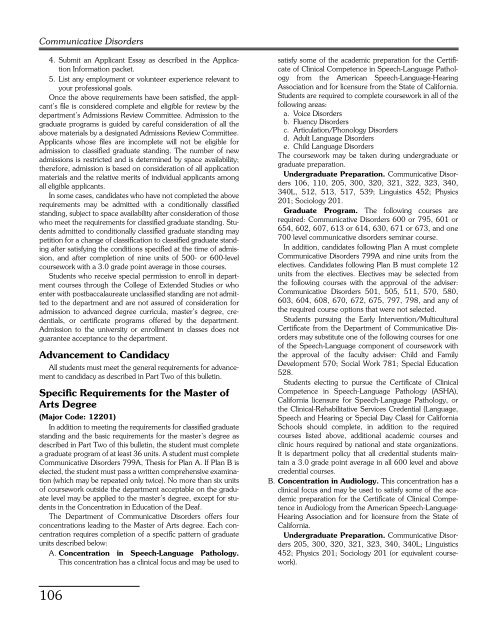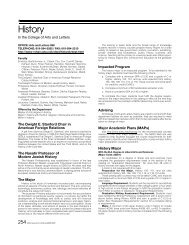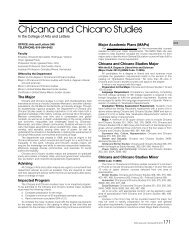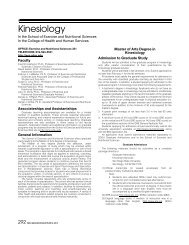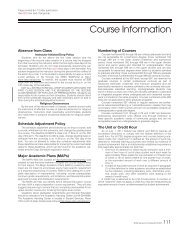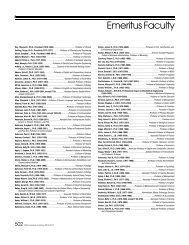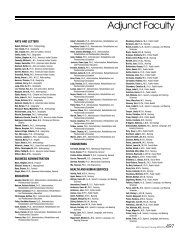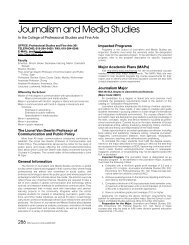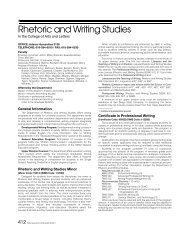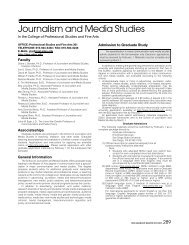President Stephen L. Weber - San Diego State University ...
President Stephen L. Weber - San Diego State University ...
President Stephen L. Weber - San Diego State University ...
Create successful ePaper yourself
Turn your PDF publications into a flip-book with our unique Google optimized e-Paper software.
Communicative Disorders<br />
4. Submit an Applicant Essay as described in the Application<br />
Information packet.<br />
5. List any employment or volunteer experience relevant to<br />
your professional goals.<br />
Once the above requirements have been satisfied, the applicant’s<br />
file is considered complete and eligible for review by the<br />
department’s Admissions Review Committee. Admission to the<br />
graduate programs is guided by careful consideration of all the<br />
above materials by a designated Admissions Review Committee.<br />
Applicants whose files are incomplete will not be eligible for<br />
admission to classified graduate standing. The number of new<br />
admissions is restricted and is determined by space availability;<br />
therefore, admission is based on consideration of all application<br />
materials and the relative merits of individual applicants among<br />
all eligible applicants.<br />
In some cases, candidates who have not completed the above<br />
requirements may be admitted with a conditionally classified<br />
standing, subject to space availability after consideration of those<br />
who meet the requirements for classified graduate standing. Students<br />
admitted to conditionally classified graduate standing may<br />
petition for a change of classification to classified graduate standing<br />
after satisfying the conditions specified at the time of admission,<br />
and after completion of nine units of 500- or 600-level<br />
coursework with a 3.0 grade point average in those courses.<br />
Students who receive special permission to enroll in department<br />
courses through the College of Extended Studies or who<br />
enter with postbaccalaureate unclassified standing are not admitted<br />
to the department and are not assured of consideration for<br />
admission to advanced degree curricula, master’s degree, credentials,<br />
or certificate programs offered by the department.<br />
Admission to the university or enrollment in classes does not<br />
guarantee acceptance to the department.<br />
Advancement to Candidacy<br />
All students must meet the general requirements for advancement<br />
to candidacy as described in Part Two of this bulletin.<br />
Specific Requirements for the Master of<br />
Arts Degree<br />
(Major Code: 12201)<br />
In addition to meeting the requirements for classified graduate<br />
standing and the basic requirements for the master’s degree as<br />
described in Part Two of this bulletin, the student must complete<br />
a graduate program of at least 36 units. A student must complete<br />
Communicative Disorders 799A, Thesis for Plan A. If Plan B is<br />
elected, the student must pass a written comprehensive examination<br />
(which may be repeated only twice). No more than six units<br />
of coursework outside the department acceptable on the graduate<br />
level may be applied to the master’s degree, except for students<br />
in the Concentration in Education of the Deaf.<br />
The Department of Communicative Disorders offers four<br />
concentrations leading to the Master of Arts degree. Each concentration<br />
requires completion of a specific pattern of graduate<br />
units described below:<br />
A. Concentration in Speech-Language Pathology.<br />
This concentration has a clinical focus and may be used to<br />
106<br />
satisfy some of the academic preparation for the Certificate<br />
of Clinical Competence in Speech-Language Pathology<br />
from the American Speech-Language-Hearing<br />
Association and for licensure from the <strong>State</strong> of California.<br />
Students are required to complete coursework in all of the<br />
following areas:<br />
a. Voice Disorders<br />
b. Fluency Disorders<br />
c. Articulation/Phonology Disorders<br />
d. Adult Language Disorders<br />
e. Child Language Disorders<br />
The coursework may be taken during undergraduate or<br />
graduate preparation.<br />
Undergraduate Preparation. Communicative Disorders<br />
106, 110, 205, 300, 320, 321, 322, 323, 340,<br />
340L, 512, 513, 517, 539; Linguistics 452; Physics<br />
201; Sociology 201.<br />
Graduate Program. The following courses are<br />
required: Communicative Disorders 600 or 795, 601 or<br />
654, 602, 607, 613 or 614, 630, 671 or 673, and one<br />
700 level communicative disorders seminar course.<br />
In addition, candidates following Plan A must complete<br />
Communicative Disorders 799A and nine units from the<br />
electives. Candidates following Plan B must complete 12<br />
units from the electives. Electives may be selected from<br />
the following courses with the approval of the adviser:<br />
Communicative Disorders 501, 505, 511, 570, 580,<br />
603, 604, 608, 670, 672, 675, 797, 798, and any of<br />
the required course options that were not selected.<br />
Students pursuing the Early Intervention/Multicultural<br />
Certificate from the Department of Communicative Disorders<br />
may substitute one of the following courses for one<br />
of the Speech-Language component of coursework with<br />
the approval of the faculty adviser: Child and Family<br />
Development 570; Social Work 781; Special Education<br />
528.<br />
Students electing to pursue the Certificate of Clinical<br />
Competence in Speech-Language Pathology (ASHA),<br />
California licensure for Speech-Language Pathology, or<br />
the Clinical-Rehabilitative Services Credential (Language,<br />
Speech and Hearing or Special Day Class) for California<br />
Schools should complete, in addition to the required<br />
courses listed above, additional academic courses and<br />
clinic hours required by national and state organizations.<br />
It is department policy that all credential students maintain<br />
a 3.0 grade point average in all 600 level and above<br />
credential courses.<br />
B. Concentration in Audiology. This concentration has a<br />
clinical focus and may be used to satisfy some of the academic<br />
preparation for the Certificate of Clinical Competence<br />
in Audiology from the American Speech-Language-<br />
Hearing Association and for licensure from the <strong>State</strong> of<br />
California.<br />
Undergraduate Preparation. Communicative Disorders<br />
205, 300, 320, 321, 323, 340, 340L; Linguistics<br />
452; Physics 201; Sociology 201 (or equivalent coursework).


